#“ You Should Know Better. In This House. A Queen Beats A Straight Every time.”: William Truman
Explore tagged Tumblr posts
Text
@nightwhispcrs (Mac)

❝i think that guy is giving you a weird look.❞ will nod his head towards the right. "do you know him or is he one of those serial killers that weren't caught? i know they claim they caught them all, but are they sure they did?"
#“ you should know better. in this house. a queen beats a straight every time.”: william truman#death tw
2 notes
·
View notes
Text
Will nodded at the other. "i get that, actually. you did kind of do your job, but us civilians have to be able to do something, right? to help ensure this might not happen again." will point out, shaking his head. "yeah, I have been told I don't have that either."

"I am not sure how I can help..." Jun-Ho looked at Will. "I am just a detective. My role is sort of done... Murderers caught and unable to help those who died." He said with a shrug. "I suppose the best I can say is just keep doing what you are doing. I am sorry about your clients, what I keep being told is patience." He rubbed his chin. His captain kept telling him to be patient but it wasn't his style.

7 notes
·
View notes
Audio
Today is the 1 year AO3 anniversary of Slow Show by @mia-ugly. I am beyond grateful that this experience (and it is an experience) has existed in my life for a year and felt it needed commemorating. 🎂
I’m not a creator but I made this playlist for me, so I could take the fic with me, have it with my eyes closed, while driving -- you get it. Today seems like an appropriate day to share it.
It’s a. It’s a lot. Excessive you might even say. Tumblr will only give you the first 100 songs in this, so, Spotify will fulfill you (or overwhelm you). If you hit my username on the playlist, there are separate playlists for each chapter.
This is also on Apple Music, if that’s your jam, just hit me up and I’ll send you the link.
🎉 Happy Slow Show Day!! 🎉
13 pages of track-lists and excerpts below the cut. Godspeed! 💙
Key:
Songs from Mia’s soundtrack
Songs from the Fic
.
--Title--
Slow Show – The National
_
--Prequel--
Loverman – Nick Cave & The Bad Seeds
Devils – Say Hi
_
--Chapter 1--
Here I Go Again – Whitesnake
_
bad guy – Billie Eilish
-trash a set and shag your husband
_
Something About You (ODESZA Remix) – Hayden James
-what it would take for Avery Fell to let his guard down
_
A Little Wicked – Valerie Broussard
-The handkerchief in his hand is now stained purple
_
You Light Me Up In the Dark – The Hounds Below
-His hair catches the light like a halo, making him look more of an angel than ever.
_
Lazarus – David Bowie
-This could be a problem
_
--Chapter 2--
Unsteady – X Ambassadors
-much easier than talking about the way his heartbeat is still racing
_
Heart of a Dog – The Kills
-Call me darling again.
_
The Twilight Hour - Still Corners
-Looked across the set and thought, Ah fuck me. I’m in love with him.
_
God’s Mistake – Tears for Fears
-Avery: He’s closed his eyes again, mouth going flat and still.
_
Lounge Act – Nirvana
-Tell her all the terrible things I want to do to her husband
_
Transatlanticism – Death Cab for Cutie
-There’s a strange urgency tonight, though, and Crowley can guess why.
_
Do I Wanna Know? – Arctic Monkeys
-What could it hurt?
_
Clueless – The Marias
-“Better - yeah. ‘S late.”
_
Motel – Meg Myers
-The hotel room is another disaster
_
--Chapter 3--
Alone in a Room – Asking Alexandria
-“I’m having a moment here!”
_
Since You’ve Been Around – Rosie Thomas
-makes Crowley feel like he can breathe again
_
Home Again – The Disco Biscuits
-It’s starting to feel like home again
_
Every Other Freckle – alt-J
-Perfect. Ridiculous and impossible and perfect.
_
Something For the Longing – The Orchids
_
As Far As I Can See – Phantogram
-it’s been a really, really long time
_
Sinister Kid – The Black Keys
-“Mothering buggering shit-”
_
All These Things That I’ve Done – The Killers
-Crowley fists one of his hands against his forehead, shuts his eyes tightly.
_
--Chapter 4--
I Like Me Better – Lauv
-I liked the outline of your face under the stagelights
_
I Do This for You (ft. Marlene) – Giorgio Moroder
-“Let me see what I can do. About your precious Hamlet.”
_
The Longing – Imelda May
-Avery POV: “Look at him like - like - you can’t let him see the way you look at him.”
_
Just a Man – Los Lobos
-Avery POV: like he’s being led into battle and not onto a set to do the job he loves
_
World In My Eyes – Depeche Mode
-wants to make that bastard purr
_
Tired (ft. Gavin James) – Alan Walker
-Let me be a magpie for you
_
Blow My Mind – The Benjamin Gate
-Avery: “I know you now.”
_
Breathe You in My Dreams – Trixie Whitley
-Crowley’s seen that expression on Avery’s face in his dreams
_
Love Me Like That (ft. Carly Rae Jepsen) – The Knocks
-What have I done to - oh. Oh. Right.
_
Like Real People Do - Hozier
-“Sure, angel, what- whatever.”
_
Clearly – Grace VanderWaal
-Crowley waits for the rest of the night.
_
Gwendel – PeelsDeen
-Az sits in the back seat, away from Crowley. Alone.
_
Now I’m In It – HAIM
-Avery POV: It’s a look like an open grave, a look like desire tempered with grief…
_
Flesh for Fantasy – Billy Idol
-Crowley isn’t lonely for the rest of the night
_
--Chapter 5 (Avery POV)--
Smalltown Boy – Rosborough
-1978, Hartlepool
_
Bright Horses – Nick Cave & The Bad Seeds
-1986, Newcastle Upon Tyne
_
The Runner – Foals
-1991, Bristol
_
Shock To Your System – Tegan and Sara
-Tracy: “Why d’you let them?”
_
Cracking Codes – Andrew Bird
-“Forever, of course. I’ll never -”
_
Colour me In – Damien Rice
-Their fingers - just touch. Slightly.
_
I’m Not in Love – 10cc
-Less to regret by not ever speaking of it.
_
--Chapter 6--
Electric Current – Lower Dens
-“I’ll let you know when you find it.”
_
Guess I Miss(ed) You – The Daylights
-Keep talking, keep him here a little while longer.
_
Reflecting Light – Sam Phillips
-“don’t meet his eyes like that, it looks like it’s a lead-in to a kiss”
_
King of Pain – The Police
-a good reminder of the kind of life he’s got to live
_
I Wanna Get Better – The Bleachers
-and Avery’s gaze is so gentle it hurts a bit
_
Feather – X Ambassadors
-Avery: “Someone has to”
_
Darker Side - Jonny Lang
-Avery: “Oh - good Lord.”
_
Firestone (Acoustic) – Conrad Sewell
-“Will you show me?”
_
Velvet Gloves and Spit - Timber Timbre
-“Anthony - ”
_
Wrong – Depeche Mode
-Avery: “I have to go.”
_
F**k it I love you – Lana Del Rey
-“Not your fault, angel”
_
--Chapter 7--
Somebody to Love – Queen
_
Heavenly – Cigarettes After Sex
-“I fucking still.”
_
Will Do - TV on the Radio
-“You too. I’ll see you there.”
_
Monster – Colours
-No wonder Avery ran off like a thief after a heist
_
Swallow My Pride – Ramones
-“I feel fucking ill about it.”
_
I Was Wrong - The Oh Hellos
-Avery: “I’m the one who has to apologize, not you.”
_
The Lost Art of Keeping a Secret – Queens of the Stone Age
-Avery: “Please don’t tell anyone”
_
Wait for Me – Kings of Leon
-Avery: “Right now, I’m just - a bit in pieces.”
_
Don’t Stay – X Ambassadors
-“You can - stay or leave or - whatever you like.”
_
The Moth - Aimee Mann
-Avery’s eyes meet his, and then it’s like a car accident
_
Red Door – Julien Baker
-“I can - I can wait longer.”
_
Can’t Pretend - Tom Odell
-“I wasn’t apologizing for that. This morning. I won’t.”
_
Come Down to Me – Saving Jane
-Avery: “You were wonderful”
_
Secret Smile – Semisonic
-And if sometimes he catches Az watching him between takes
_
I Want More - KALEO
-Az laces both of their hands together, stares at them.
_
I’m Gonna Do My Thing – Royal Deluxe
-“So don’t tell me what will hurt me. I know what hurts.”
_
--Chapter 8--
Perfect Day – Lou Reed
_
Remember to Breathe – Sturgil Simpson
-“You can’t sit in the car all night you absolute nightmare”
_
Wild Love (Acoustic) – James Bay
-The two of them stare at each other and then both look away awkwardly.
_
Seasons – Future Islands
-finally, fucking finally, he’s exactly where he wants to be
_
Closer – Tegan and Sara
-Avery: “if you like”
_
I Want All of You – The Verve Pipe
-“If you think I can survive this without looking at you -”
_
Use Me – Miguel
-whatever he sees in Crowley’s face makes him come to some sort of decision
_
So Much Love – Depeche Mode
-Love, he said love
_
Don’t Be Scared, I Love You – Bill Ryder-Jones
-I know you, Crowley wants to say, but doesn’t.
_
Become My Dream – Silya & The Sailors
-“Even if - anything, angel.”
_
I Belong In Your Arms – Chairlift
-For nearly two weeks it goes like this.
_
Faster - Matt Nathanson
-“You’re going to fucking kill me, angel -”
_
Come Together (feat. Sivu) – LAUREL
-In case you think they don’t wake up together
_
The High – Kelela
-Az has pulled a stool over to the edge of the tub
_
Just in Time – Valerie June
-Then Az’s hand is on his shoulder, turning him around.
_
I Can’t Take It – Tegan and Sara
-Avery: “Don’t rush, just - like this.”
_
Like This – Jake Scott
-Avery murmurs and it takes Crowley back to their first kiss
_
Terrible Love – The National
-Flinches away from him.
_
Help You Out - Emarosa
-And he nods.
_
--Chapter 9--
I Remember You – Ramones
-The first person Crowley loved was a liar.
_
Brighter Skies - Race Banyon
-As if they were cut with a jigsaw, as if they were meant to fit.
_
Not Tonight – Tegan and Sara
-When they reach the edge of the city, his hand slides out of Crowley’s.
_
As Sure as I Am – Crowded House
-So Crowley kisses him.
_
A Promise – Miriam Makeba
-And for awhile, he believed her.
_
Mistaken for Strangers – The National
-They’re only two small words, but they still make Crowley’s teeth ache.
_
Hey, That’s No Way To Say Goodbye – Leonard Cohen
-“Good-“ Swallow, speak, leave.
_
The Fear – Pulp
-Crowley should have been smarter this time. He really should have been.
_
Take Me – Leela James
-“I’d like you to close your blinds.”
_
Whenever You Want It – Clare Maguire
-“What do we do now?”
_
At My Weakest – James Arthur
-“It will be.”
_
Komm zurück - Fotos
-For years and years and years, nothing did.
_
Come on Get Higher – Matt Nathanson
-their feet sliding in the tub
_
Lay Down – Sarah Proctor
-I want to wake up with you.
_
Sort Of - Ingrid Michaelson
-Why is my heart breaking?
_
Fairytale of New York – The Pogues
-Just pump that shit straight into his veins.
_
What Are You Doing New Year’s Eve? – Ella Fitzgerald
-Avery: “What do you think?”
_
We’re Gonna Have A Real Good Time Together – The Velvet Underground
-“You want to grab dinner somewhere?”
_
Hiding – IAN SWEET
-Crowley stops walking. Looks at Az in the darkness.
_
Romance Dawn – Radkey
-A slice of light cuts through the darkness.
_
Crown of Love – Arcade Fire
-Crowley feels like the world has never been darker, and his heart will never stop beating
_
Devil’s Backbone – The Civil Wars
-He thought he was ready for this conversation, but at the sight of Az’s face, his throat has gotten too tight to speak.
_
Sinners – Lauren Aquilina
-“If this all goes down in flames, if it all falls apart - we can go off together.”
_
Please Forgive Me (Song of the Crow) – William Fitzsimmons
-Avery: “It’s over. I’m - I’m so sorry.”
_
Start a War – The National
-He twitches and trips and yet somehow manages to walk away without falling over.
_
Broken – Daley
-And this soft heartache was somehow the sharpest of them all.
_
--Chapter 10 (Avery POV)--
Daily Battles - Thom Yorke & Flea
-He tries to remember these things - but the background is still a chorus of beeping machines. There’s nowhere he can be but here.
_
Everybody Wants You - Red Hearse
-Go out and surround himself with people much more interesting and available than Avery. Better people, certainly.
_
A Thin Line – Blackchords
-But still - roads not taken, and other fun middle-aged spirals.
_
My Own Soul’s Warning - The Killers
-When was the last time someone asked Avery that? When was the last time he asked himself?
_
Who Am I - NEEDTOBREATHE
-I miss you. There. It didn’t hurt as much as he thought it would.
_
Wait for Me - Jack Curley
-What he wants to say is ‘don’t find someone else. Not yet. You and your black leather and your cut-glass profile: you’re gorgeous and God knows other people want you.’
_
Coming & Going – Amaal
-“Two ships passing in the night,” he says quietly. Then he takes a swallow of wine, lets it roll down his throat. “If you were here -”
_
Iron - Woodkid
-Crowley leaves him there, pressed against the wet brick wall. Crowley leaves him there. Crowley steps between Avery and a camera, and then leaves him.
_
The Greatest Bastard - Damien Rice
-He can’t be the person that kicks Crowley into the ashes again. He can’t hurt him like this, and Avery’s going to hurt him - he already has.
_
No Right to Love You – Rhys Lewis
-He deserves someone like - like Daniel. Deserves to be loved in the daylight.
_
If It’s Hurting You - Robbie Williams
-Time is a tricky business when you’re dying slowly; it skips like a flat stone on a quiet lake.
_
Happy For You – Gayle
-But surely - surely he’s allowed just this much. Just one message, just so Crowley knows that - that he’s happy for him. That Avery is so happy.
_
I See You (ICU) - Phoebe Bridgers
-When Avery sees Crowley on the red carpet, it feels like the sudden remembrance of a lovely dream.
_
Once In My Life - The Decemberists
-Crowley: “I know there’ve been some - hard times. That’s - that is what it is. But for me - it’s been a privilege. A dream. So.” He nods and nods and nods again. “Thank you.”
_
Coming Down - Dum Dum Girls
-Tracy: “But I wasn’t. I was hurting you. This whole time, Az.” She shakes her head, wiping frantically at tears that won’t stop falling. “He loves you.”
_
I Don’t Know Anything – Little Voice Cast
-He’s afraid of finding out that all this time - he was doing the wrong thing anyway. He’s afraid that Anthony Crowley will never talk to him again.
_
Sweet Sour - Band of Skulls
-"And you're fired"
_
Heart Attack - Devarrow
-The sun is still rising when Avery gets out of the car, closes the door behind him. Though some of the roads have changed, his feet still know the way down to the docks of his youth. He was never a sailor, but the shoreline is familiar as a childhood sweetheart, as a long lost love.
_
Landslide - Robyn Sherwell
-He’s alone, and he’s nearly fifty years old. He could get on a ship, he could throw himself into the sea. There’s no one holding him back anymore.
_
All I Can - Sharon van Etten
-And he knows. He knows.
_
--Chapter 11--
Salvation - The Strumbellas
- there’s a moment where he swears he sees a young idiot in black standing in the crowd. Red hair gelled up into spikes, black t-shirt full of holes and safety pins. A young man who has no idea how much he’s about to lose.
_
Soldier - Fleurie
-And he’s still fucking here.
_
Easier – Mansionair
-Then he gets the fuck above ground and he calls Beez (oh great, they’re his emotional-support-asshole now. That’s healthy).
_
Deep End – Holly Humberstone
-“I brought you cheese,” Beez says, and Crowley starts crying.
_
Falling Short – Lapsley
-For the next few days, he lets his stupid body do what it needs to do to keep himself upright.
_
Chariot (Stripped Version) - Gavin DeGraw
-Shit, this was a bad bad idea.
_
Quiet Light - The National
-There’s a text from Az later that night, and his name on Crowley’s phone makes him feel like jumping off a cliff.
_
All That We Had is Lost - Postiljonen
-He’s not allowed to be in love with that man anymore. Wasn’t ever, really.
_
Heal - Tom Odell
-It makes a rather hysterical laugh well out of his throat. Anthony fucking Crowley. You are still alive.
_
Let Me Go - HAIM
-Crowley tries to ignore the soft, injured expression on the other man’s face as he turns away.
_
A Beginning Song - The Decemberists
-“What’s more frightening than having a choice?”
_
The Spark - William Prince
-And he likes to think he would have just burned the world to ashes with the power of his love, would have said fuck everyone, I choose you – but who knows.
_
Sharp Scratch - The Slow Show
-So stupid, I know, and I’m - sorry, I still love you and I’m tryin’ to stop and I will I just - needed to tell you that. I’ll be fine. You’ll be fine. Just miss you.
_
Beautiful & Brutal – Plested
-Crowley moves without thinking. Falls like a stagelight, glass everywhere. He walks forward and is kissing Az before the door has even been pulled shut.
_
Bad Chemistry - Fake Shark
-“I’ve been - thinking about this -” Az says between darts of his tongue against Crowley’s overheated skin.
_
All We Do – Oh Wonder
-“But I - I love you. And I can’t - hide. It hurts too much.”
_
Broken Strings - James Morrison (ft Nelly Furtado)
-“I wouldn’t survive it. That way it was. I wouldn’t.”
_
Stole the Show – Parson James
-But even on their distant shores, Crowley and Az don’t stop looking at each other. It feels like an ending. Maybe it is one. Not a happy ending, but not a bad one either.
_
Level Up - Vienna Teng
-excerpt from Anthony Crowley: Out of the shadows, under the spotlight
_
The Wire (Alternate Version) – Patrick Droney
-Avery: “I’m rather in - in love with you.”
_
Sweet Thing - Van Morrison
-“You can stay at my place. If you like.”
_
Falling in Love - Cigarettes After Sex
-“I love you. I’ve missed you, and I love you, and I want you -”
_
Stay - Cat Power
-He watches the slow flicker of awareness in Avery’s blue eyes. The curve of his mouth into a shade of smile that Crowley’s never seen before.
_
Freedom - George Michael
-“To the world.”
_
--Chapter 12--
Banks - NEEDTOBREATHE
-What he wasn’t used to was bringing someone else down with him, and jail would be a bloody blessing compared to seeing Az grey-faced and staring out windows, or that one time Crowley’s pretty sure the man was crying in the bathroom, trying to swallow down the sound so that Crowley didn’t notice (he clenches his hands into fists just thinking about it).
_
Black Mambo - Glass Animals
-“It’ll have to be.” Crowley drops to his knees. “There’s a lot of ground to cover.”
_
Florets - Grace VanderWaal
-Crowley can let his fingers curl against Az’s palm, can watch him open as a flame, not caring who notices.
_
Sight of the Sun - fun.
-That this longing won’t destroy him, and won’t destroy Az either. It’s not a shovel for burying Crowley alive - it’s a spade for planting things.
_
Pale Blue Eyes - The Velvet Underground
-Az drops his hand onto Crowley’s knee (“What is this song? I rather like it.”).
_
Only Everything (Acoustic) – Quinn Lewis
-“It’s nice to have someone make it for you, right? Sometimes,” Crowley says softly, too much love in his throat and in his hands. It’s hard to breathe around it, especially when Avery is looking at him.
_
The Book of Love - The Magnetic Fields
-“You bought a cottage for us.” Crowley is an animal being taught to speak through scraps of meat and electric shocks. “This cottage.”
_
Say You’ll Be Mine – Christopher Cross
-Avery: “But if you wanted -” Fuck, there are tears in Avery’s eyes. “If you want. I’d like to call you my husband. I’d like to say ‘let me ask my husband,’ or ‘I brought my husband with me’ or ‘my husband won a BAFTA’.”
_
Anthem - Leonard Cohen
-Their broken edges match. And somehow, the light still shines through.
_
Precious Love – James Morrison
-When the light catches them both, they shine. And so do you. So do we.
_
Good Man (acoustic) - Josh Ritter
_
_
If you made it this far...wow, hi hello. So, this is ours and my musical exposure is limited, if you’ve got a better song for an excerpt, feel free to shoot it over, more than happy for this to be a living changeable thing. 🤡
#slow show#slow show playlist#tumblr html code after read more is some bullshit#it's fic for your ears
177 notes
·
View notes
Text
Sexist Tropes in “Game of Thrones”
Missing Mom Trope / Death by Childbirth Trope
Missing Moms are considered more unusual than missing fathers, and they are more likely to have their absence explicitly explained (usually with death). Death by Childbirth is very often the cause of a Missing Mom, as not only does it get the mother out of the way whilst keeping her sympathetic but it adds an extra touch of tragedy to the protagonist's life

Lyanna Stark (Aisling Franciosi): Jon Snow’s mother
Rhaella Targaryen: Viserys and Daenerys’ mother
Joanna Lannister: Cersei, Jaime and Tyrion’s mother
Straw Matriarchy (Powerful Women are Evil) Trope
Women are shown to be fundamentally incapable of governing or utterly evil and castrating in their power-wielding

Cersei Lannister (Lena Headey): Queen Regent; Queen of the Andals, the Rhoynar and the First Men and Protector of the Seven Kingdoms
Lysa Arryn (Kate Dickie): Lady of the Vale
Ellaria Sand (Indira Varma): Prince Oberyn’s paramour
Olenna Tyrell (Diana Rigg): did whatever was necessary (including murder) for her family to remain in power
Daenerys Targaryen (Emilia Clarke): Khaleesi of the Great Grass Sea; Queen of Meereen; Queen of the Andals, the Rhoynar and the First Men and Protector of the Seven Kingdoms and Lady of Dragonstone
Hysterical woman Trope
Women as less rational, disciplined, and emotionally stable than men, and thus more prone to mood swings, irrational overreactions, and mental illness

Lysa Arryn (Kate Dickie)
Myranda (Charlotte Hope)
Selyse Baratheon (Tara Fitzgerald)
Daenerys Targaryen (Emilia Clarke)
Women Who Enjoy Sex are Evil Trope
Sex is regarded as fraught and dangerous


Doreah (Roxanne McKee): murdered Irri and helped Xaro Xhoan Daxos stealing Daenerys’ dragons
Cersei Lannister (Lena Headey): murdered every enemy she could get her hands on to remain in power
Shae (Sibel Kekilli): betrayed Tyrion Lannister by blaming him for Joffrey’s murder
Ellaria Sand (Indira Varma): murders Myrcella Baratheon and Doran Martell
Lysa Arryn (Kate Dickie): murdered her husband, Jon Arryn; lied to her sister, Catelyn, blaming the Lannisters for Jon’s death; tried to kill Sansa Stark out of jealousy
Myranda (Charlotte Hope): helped Ramsay Snow in his torture games; tormented and tried to kill Sansa Stark
Tyene Sand (Rosabell Laurenti Sellers): alongside with her sisters, Nymeria and Obara, helped her mother, Ellaria, betraying House Martell
Daenerys Targaryen (Emilia Clarke): burns down King’s Landing
I Was Quite a Looker Trope
You all know them. That kindly old lady who lives down the street. The tiny, wrinkly, owner of the local dojo. The aged, fading seductress. Wrinkled, aged, musty... but they weren't always that way. Once upon a time they were attractive, very attractive.
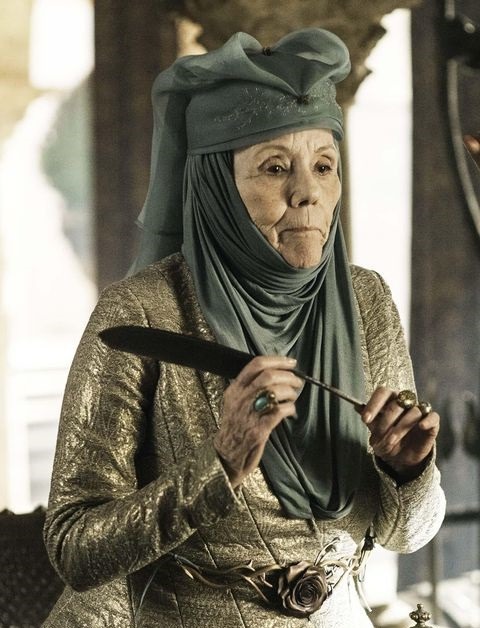
Olenna Tyrell (Diana Rigg)
Disposable Woman Trope
This character has a familial or romantic relationship with a protagonist, which allows creators to derive heart-wrenching sorrow from her death.

Talisa Stark (Oona Chaplin): provided a minute of Man Pain to the protagonist Robb Stark before his murder by Roose Bolton
Ygritte (Rose Leslie): provided Man Pain to the protagonist Jon Snow
Shae (Sibel Kekilli): provided Man Pain to the protagonist Tyrion Lannister
Daenerys Targaryen (Emilia Clarke): provided Man Pain to the protagonist Jon Snow
Disposable Sex Worker Trope
The prostitutes are killed because they know something they shouldn't, or a villain thinks they do.
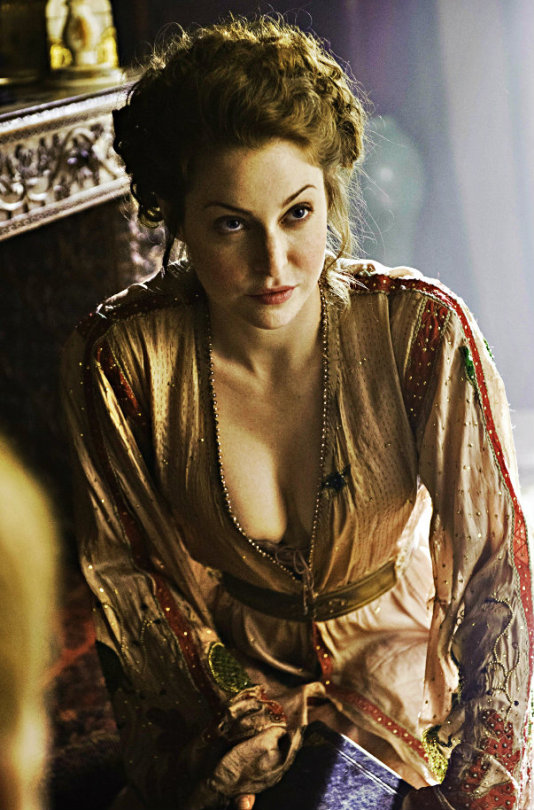
Ros (Esmé Bianco): Petyr Baelish gifts her to Joffrey Baratheon to torture and kill because she’s been working for Varys
Woman Scorned Trope
What’s the only type of woman more dangerous than a Mama Bear? A woman who’s been dumped, cheated on, or otherwise done wrong by her significant other. Especially if she’s been hiding some sanity problems,

Lysa Arryn (Kate Dickie): tried to kill Sansa Stark out of jealousy
Ygritte (Rose Leslie): go on a murdering spree after being betrayed and abandoned by Jon Snow
Shae (Sibel Kekilli): testifies against Tyrion Lannister in his trial for Joffrey’s murder for believing he didn’t care for her and was shipping her off
Myranda (Charlotte Hope): tried to kill Sansa Stark out of jealousy
Daenerys Targaryen (Emilia Clarke): slaughters every men, women and child in King’s Landing after being rejected by Jon Snow
The Glorious War of Sisterly Rivalry Trope / Sibling Rivalry Trope
There are two sisters, close enough in age to have a relatively equal relationship, but light years apart in personality.
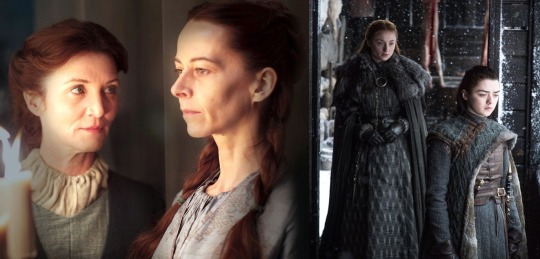
Catelyn Stark (Michelle Fairley) vs. Lysa Arryn (Kate Dickie)
Sansa Stark (Sophie Turner) vs. Arya Stark (Maisie Williams)
Tomboy and Girly Girl Trope
The "Girly Girl" will highly care about her appearance, pursue "girly" interests, and is often (though not always) The Chick. The Tomboy will be into sports, mechanics, or the like. The two ladies will have some sort of relationship with each other, whether they're best friends, sisters, on the same team
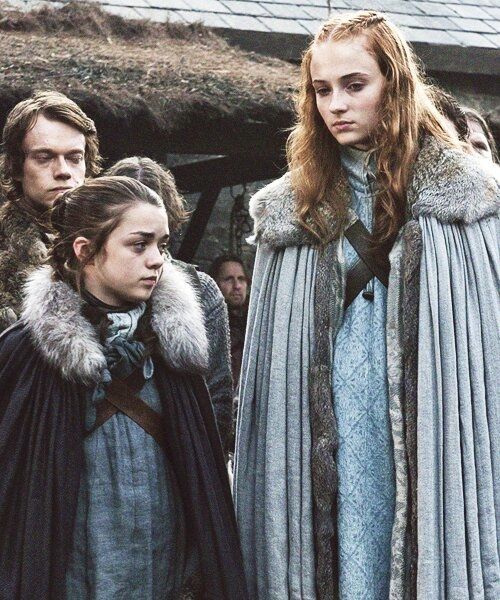
Sansa Stark (Sophie Turner) vs. Arya Stark (Maisie Williams)
Mama Bear Trope / Motherhood Is Superior Trope
Like many other mammals depicted throughout history as predators, bears are actually passive animals, and won't attack humans unless provoked. Despite this, if you even think about getting between a mother bear and her cub she'll tear straight through you. Threaten her children, and you are in for a world of hurt.
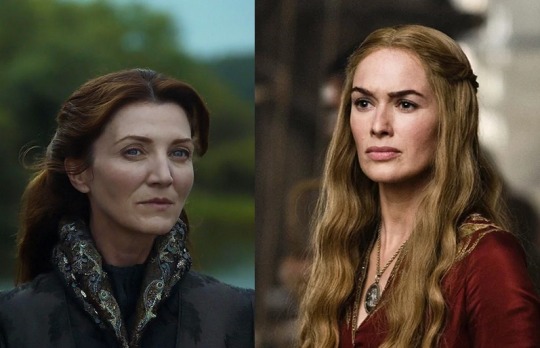
Catelyn Stark (Michelle Fairley)
Cersei Lannister (Lena Headey)
No Guy Wants an Amazon Trope
All Guys Want Cheerleaders, but no guy wants a girl who can beat him up.
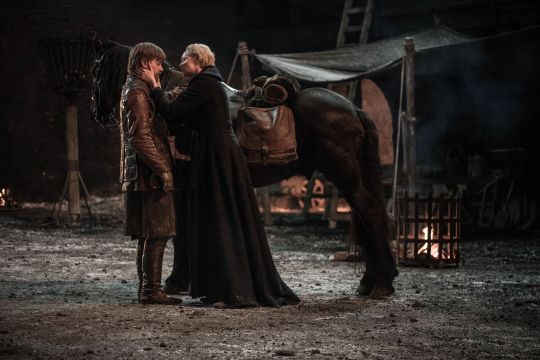
Brienne of Tarth (Gwendoline Christie) is unceremoniously dumped by Jaime Lannister because he wants to return to his traditional feminine ex-lover, Cersei
Female Misogynist Trope / Not Like Other Girls Trope
Considers other girls to be inferior- not like her. People will remind her that she's a girl herself, but she will deny it - or consider herself an "honorary dude" or claim she's "not like the other girls" (i.e. she's ''better'' than the other girls, in her mind).
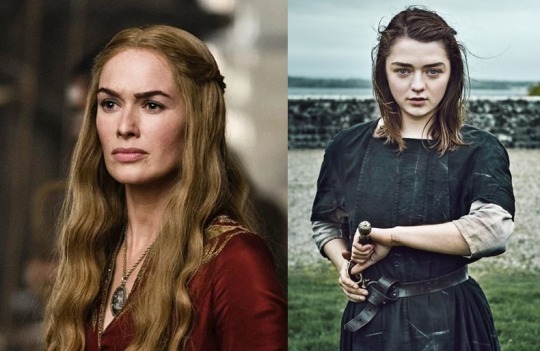
Cersei Lannister (Lena Headey): I should have been born a man. I’d rather face a thousand swords than be shut up inside with this flock of frightened hens
Arya Stark (Maisie Williams): Most girls are idiots.
Fiery Redhead Trope
A Fiery Redhead is a red-haired character who is strong, Hot-Blooded, outgoing, usually outspoken, and (if a love interest) often female. She has a big personality and she's not afraid to use it. Whatever you do, don't get on her bad side, or there will be hell to pay.
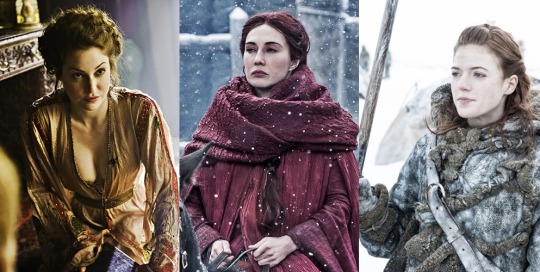
Ros (Esmé Bianco)
Melisandre (Carice van Houten)
Ygritte (Rose Leslie)
Sleeping Their Way to the Top Trope
There are many ways to rise to the top, some more pragmatic than others. Some people decide to use their charms and sex appeal to boost their career. It's usually frowned upon by other characters, and may have certain downsides to it, but for some it proves to be the key to their success.

Margaery Tyrell (Natalie Dormer)
Real Women Don't Wear Dresses Trope
A woman is shown as weak, incompetent, and ineffectual unless she dresses and behaves in a masculine manner, or is otherwise applauded for being "not like other girls."

Arya Stark (Maisie Williams)
Brienne of Tarth (Gwendoline Christie)
Ygritte (Rose Leslie)
Yara Greyjoy (Gemma Whelan)
Nymeria Sand (Jessica Henwick), Obara Sand (Keisha Castle-Hughes) and Tyene Sand (Rosabell Laurenti Sellers)
Madonna–Whore Complex Trope
A pattern of thought that divides female-humanity into two mutually exclusive categories: Madonnas and Whores. The virtuous Madonna figure, possessing and protecting social virtue is an object of worship and everything that all females should aspire to be. However, sex is not part of this. The Whore, always with massive sex appeal, catering to the male gaze, is often evil and scheming
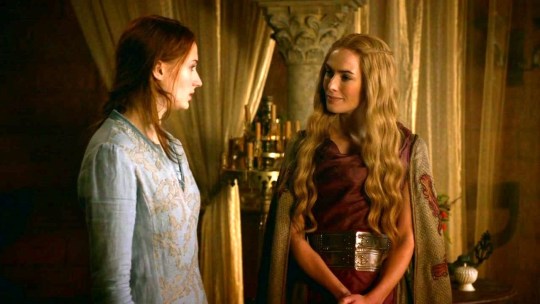
“The Whore” Cersei Lannister (Lena Headey) vs. “Madonna” Sansa Stark (Sophie Turner)
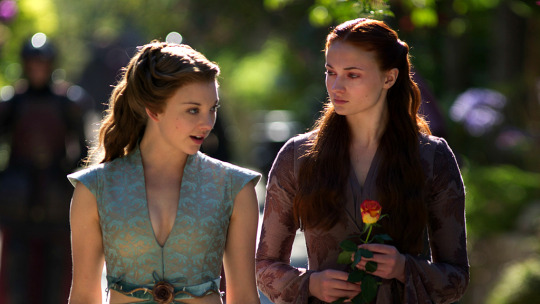
“The Whore” Margaery Tyrell (Natalie Dormer) vs. “Madonna” Sansa Stark (Sophie Turner)
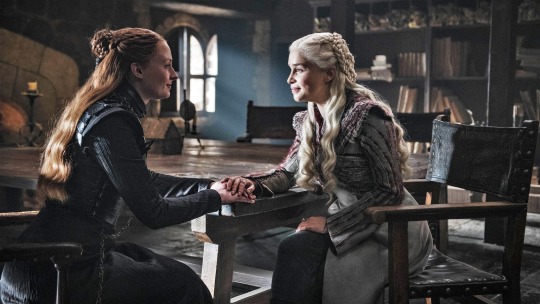
“The Whore” Daenerys Targaryen (Emilia Clarke) vs. “Madonna” Sansa Stark (Sophie Turner)
Sour Prudes Trope
Accusing other women (or sometimes men) of being "skanks", "sluts", "cheap" and whatnot.
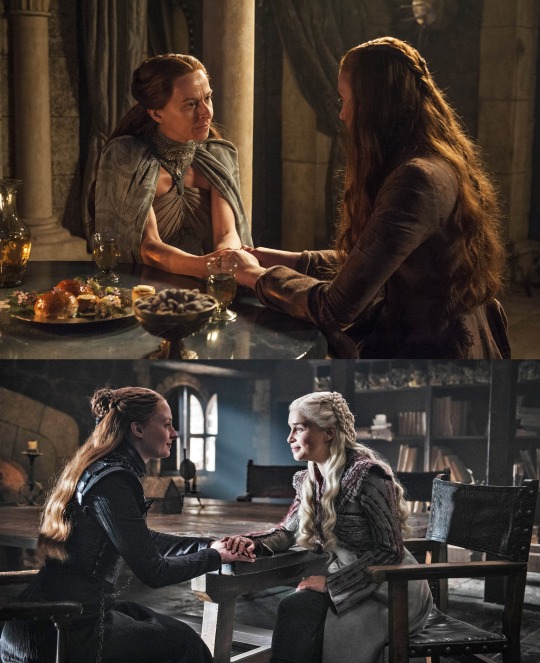
Lysa Arryn (Kate Dickie) vs. Sansa Stark (Sophie Turner): Lysa falsely accuses her niece, Sansa, of sleeping with Petyr Baelish
Sansa Stark (Sophie Turner) vs. Daenerys Targaryen (Emilia Clarke): Sansa implies Daenerys is (sexually) manipulating her brother, Jon Snow
God Save Us from the Queen! Trope
While kings and princes can be good or evil, and nice or mean, and princesses are (almost) always good, queens tend to be the royalty version of Always Chaotic Evil. Once a queen is in charge, things get nasty.

Cersei Lannister (Lena Headey)
Daenerys Targaryen (Emilia Clarke)
#game of thrones#anti game of thrones#anti d&d#sexism#sexism on pop culture#daenerys targaryen#ygritte#shae#talisa stark#sansa stark#arya stark#ros#catelyn stark#lysa arryn#cersei lannister#myranda#selyse florent#brienne of tarth#sand snakes#ellaria sand#tyene sand#obara sand#nymeria sand#doreah#missandei
766 notes
·
View notes
Text
‘Essentially, the monarchy is corrupt’ – will republicanism survive Harry and Meghan?
The campaign group Republic is committed to bringing down the House of Windsor, despite a wedding that may deepen the publics emotional bond with the royals. Is it right to argue that this soap opera is less popular than people think?

On a scorchingly hot Saturday lunchtime in Leeds, the varied strands of the British left have gathered outside the city’s art gallery for their annual May Day parade. They are all here: the Labour party, the Communist party, the Socialist party, a smattering of trade unions, the Alliance for Workers’ Liberty and a handful of vegans chalking slogans on the paving stones. Meanwhile, under a green gazebo adorned with the tagline “End the Reign”, activists from a radical organisation that resists any left/right stereotyping are setting up their stall and hoping for a decent couple of hours’ business.
On a trestle table, they have arranged a handful of laminated blowups of newspaper articles, mostly from the Guardian, about Prince Harry being interviewed by police about the killing of rare birds, the Queen’s £82m income and the “black spider letters” – named after Prince Charles’s eccentric handwriting – that revealed the future king’s efforts to influence some of the policies of the last Labour government. The basic point all this bumf is intended to illustrate is presented in a four-page A5 leaflet. “Monarchy must go,” it says, explaining why having a hereditary head of state “goes against every democratic principle”, as well as claiming that looking after the royals costs the public purse £334m a year.
The Yorkshire branch of Republic – the pressure group dedicated to “campaigning for a democratic alternative to the monarchy” – has been in existence since 2012. Its prime movers reckon they have a database of “a few hundred” supporters across the region, but the group’s once-a-month campaigning work tends to be carried out by a handful of committed activists. Today, there are four: Shaun Iggleden, 52; Nigel Catling, 59; Ian Cox, 64; and 41-year-old Mark Baxter.
Nigel Catling from Republic campaigning at the May Day rally in Leeds. Photograph: Christopher Thomond for the Guardian
The fact that they are all older white men perhaps illustrates the parts of the population their campaigning has yet to reach, but they are far from being the cranks and anoraks some people would have you believe. Their arguments against the monarchy are calm, lucid and eloquent; they all have a clear sense of how difficult this enduring, often bizarre, institution is to campaign against and how long it may take even to start to dislodge it.
The arduous nature of anti-monarchy activism is quickly proved by the 10 minutes I spend talking to Tracy, Helen and Nigel, who play in the brass band that is about to lead the May Day crowd on a five-minute lap of the surrounding area. Do they, I wonder, know what Republic is all about?
“Disestablishing the monarchy,” says Nigel, without missing a beat. “I think that was a better argument before Donald Trump got elected. That puts me off.”
“I’d keep it like it is,” says Tracy, who plays the tenor horn. “I like it. I think it’s brill: all the parades and the pomp and ceremony. And I think the Queen’s amazing.” She will be watching Prince Harry marry Meghan Markle next week. “It’s going to be great.”
What do they think about how much the monarchy costs?
“They bring so much money in,” she says. “And everything costs a lot. The government costs a lot.”
Do they worry at all about the prospect of King Charles III?
“I really think it should be William next,” says Helen, who plays the cornet. “But you don’t get to change those things.”
Tracy adds: “I don’t think Charles will be able to do what he wants, though. They get told what to do, don’t they?”
‘Will I be watching the wedding? Will I buggery’: Simon Till offers his thoughts on the royal family. Photograph: Christopher Thomond for the Guardian
Over the next two hours, passersby highlight most shades of opinion. Simon Till, a 61-year-old punk rocker whose leather jacket features the logo of those infamous seditionaries the Sex Pistols, takes a leaflet and gets straight to the point: “I’m not a monarchist. I’m not for the rich. Will I be watching the wedding? Will I buggery.”
A handful of twentysomethings cross the square, look askance at the Republic stall and greet my questions about the monarchy with a baffled surprise that soon tilts into claims that we’d be better off keeping the royals, if only for the amount of tourist money they bring in. This is a point that, needless to say, Republic fiercely contests – to quote from their campaign material: “Research shows that tourists come here for our world-class museums, beautiful scenery, fantastic shopping and captivating history – not because they might catch a glimpse of Prince Andrew.”
A woman here with the Labour party tells me that the royals “represent that massive gap between the rich and the poor”, whereas Sam, a history of architecture student, says that the monarchy “embodies the constitution”, and “Britain has never had a Hitler because the Queen wouldn’t allow it”.
Back at the Republic stall, even as the sun beats down and a sudden gust of wind threatens to blow the gazebo over a wall, the people in charge maintain a calm, steely demeanour. “I don’t know whether this is a good example, but with the suffragettes – how long did it take for women to get the vote?” asks Catling, a civil servant. “That took decades. There were women who started it who didn’t see the end of it. We’ve got to start from somewhere, and that’s what we’re trying to do – plant seeds in people’s minds.”
Do they worry that the arrival of Markle has made campaigning even more trying? They must know the arguments: that a person of colour joining the House of Windsor is supposedly a sign of modernisation, consigning to memory the facets of the institution that have been among the most problematic (such as, say, Prince Philip’s racist “quips” or his son’s recent comment that someone with brown skin didn’t look like they were from Manchester).
“Whether Harry marries Meghan Markle or not, it doesn’t alter the political nature of how the country is run,” says Iggleden, who works as a lorry driver. “That’s ultimately what we’re campaigning against. These are side issues. I’m not bothered who Harry does or doesn’t marry. It doesn’t concern me.”
Ian Cox campaigning in Leeds. Photograph: Christopher Thomond for the Guardian
It may not, but such window dressing is surely a big part of how the monarchy endures, via its emotional bond with people. In that sense, the cold realities Republic talks about – the cost, secrecy and hidden power – may not count for much at all.
“That’s something we have discussed,” he says. “How do you argue against emotion with logic? You often hear emotional responses: ‘I love the Queen.’ And you can’t argue with that. You say: ‘Yeah, but it’s undemocratic.’ And you’ll get: ‘Yeah, but I like the Queen.’”
For the past quarter-century or so, opinion polls have tended to put support for the monarchy at more than 70%, while just under one in five of us have seemed to favour a republic. The royal wobble after the death of Diana, Princess of Wales seemed temporarily to affect support for the institution, there was a big hiccup at the time of Prince Charles’s marriage to Camilla Parker Bowles – and the PR problems the next king will face are highlighted by an August 2017 poll suggesting that, if given the choice between Charles becoming king or the role passing straight to his eldest son, only 22% would favour the former, whereas William would be backed by 51%. Republicans, of course, point out that such questions only serve to highlight the monarchy’s absurdity – Charles will become king no matter what anyone thinks.
Support for the monarchy is noticeably lower among younger people: in 2016, it was reported that 84% of those over the age of 55 wanted to keep it, compared with 66% of 18-34s. The royal soap opera, though, may not be quite as popular as some people think: when Harry’s engagement was announced, 52% of respondents to a poll by YouGov said they were “indifferent”. But, overall, the royals seem to have precious little to worry about: at the last count, Ipsos Mori reckoned that 76% of people in the UK want the monarchy to continue, against only 17% who would like to see the back of it.
What is perhaps remarkable is the disappearance of republicanism from the culture. In past decades, anti-royalism was embodied by the aforementioned Sex Pistols and their Jubilee-year masterpiece God Save the Queen and the Smiths’ 1986 album The Queen Is Dead, supported by the quotes Morrissey used to utter before he became what the modern vernacular calls “problematic”. (“I despise royalty. I always have done. It’s fairy-story nonsense.”) It’s perhaps an arbitrary point of comparison, but where pop-cultural attitudes had arrived 25 years later was probably symbolised by the occasion in 2013 when Prince Harry was invited backstage by those down-home scions of the establishment Mumford and Sons. According to the Daily Mail: “He absolutely bear-hugged Marcus [Mumford] and apologised for missing their set. Marcus told him not to worry and to help himself to the beer.”
Such are the raging seas of absurdity in which Republic tries to stay afloat. For the moment, the Yorkshire branch remains its only active regional offshoot and the vast majority of its work is done from its office – or, rather, three-person workstation – near King’s Cross station, in London. Thanks to an annual income of about £140,000 – which comes from a membership base of 4,000 people, topped up with a few occasional donations of between £5,000 and £15,000, Republic has two full-time staff: its 27-year-old campaigns officer, Michael Moore, and Graham Smith, 44. The latter has been Republic’s chief executive and strategic brain since 2005, when he returned from seven years working as an IT specialist in Australia. Smith says he experienced “this huge sort of reverse culture shock” related to how much the monarchy was covered in the media and was reminded of the fact that “I’ve felt strongly about all this for as long as I can remember”.
I talk to Smith in a branch of Costa Coffee near his office, where he explains how he changed Republic from being a tiny organisation that had been set up in 1983 to something with a decent membership and a sense of purpose. “We spent quite a bit of time looking at a longer-term strategy,” he says. “We tried to imagine, as an exercise, all the MPs filing through the division lobbies and giving us a referendum on getting rid of the monarchy. We tried to imagine what kind of country would witness that happen.”
This remains the vision that most of Republic’s work is built around. As a way of steadily advancing its cause, Smith and his colleagues regularly make Freedom of Information requests, commission research, and publicise overlooked information about how the monarchy works – such as the fact that Prince Charles’s private organisation, the Duchy of Cornwall, is exempt from corporation and capital gains tax, or that the 18 royals officially classed as “working” each cost the taxpayer an average of £19m a year.
“We don’t say that the fact that the monarchy is expensive is a reason to get rid of it,” Smith cautions. “It’s not. The fact that it’s expensive is a symptom of the fact that it’s unaccountable and secretive. It’s really a way of pointing to the institution and saying: ‘Essentially, the monarchy is corrupt.’ I don’t think it’s going too far to say that. If corruption is the abuse of public office for personal gain, that is what the monarchy does. And it’s routine; it’s built into the system.”
Republic would like an elected head of state similar to the one who serves the Republic of Ireland – where the role is largely ceremonial and apolitical, but the president can speak up at times of national crisis or uncertainty.
“One example would be the two weeks after the Brexit referendum, when we were essentially devoid of political leadership,” says Smith. “We had just taken this huge, very scary decision and there were all these reports about racist attacks … it felt like a very febrile atmosphere and there was no one to rise above all that, calm nerves and show any leadership. It was a classic example of an occasion when a head of state might say: ‘This is something we’re going through and we’ll sort it out – we’re going to be OK.’”
He says he takes heart from the fact that a republican is now leader of the Labour party, and from the other anti-monarchy organisations across Europe that will be coming to London on the day of the royal wedding for this year’s convention of the Alliance of European Republican Movements (Sweden, apparently, has the strongest; in Spain, “the polling is good, but the movement is splintered”). The end of the monarchy, he says, “could happen in my lifetime – it depends how long my lifetime is”.
His main source of optimism is the prospect of King Charles III. “I think there’s a very real risk of a constitutional crisis. It’s not difficult to imagine that, after he becomes king, the government could change a policy and the new policy could be in line with what we know Charles thinks. The question will then be asked: ‘Have you done that because you think it’s the right policy or because Charles has been pressing you to change that?’”
But what if the prospect of William taking over works as a convenient distraction?
“Charles could easily be king for 20 years. That’s quite a long time to wait. By that time, William will be well into his 50s, if not his 60s. And I think all this stuff about how popular some of them are … I think it’s overblown. I don’t think people care that much. William has lost that youthful Diana look, and he’s a fairly dull, uninspiring individual. There’s time for the gloss to wear off. You can find headlines from the 1970s that say: ‘Prince Charles is the young prince who’s going to save the monarchy.’ All this stuff gets said over and over again.”
Back in Leeds, as Republic’s activist quartet start to pack up the green gazebo, they explain their immediate plans. On the day of the royal wedding, they will be in Parliament Street in York. “I think we’re providing a public service, in some respects,” says Nigel Catling. “There are a lot of people out there who are probably Republicans, but who don’t know. We’ll be there, saying: ‘If you don’t agree with an unelected head of state, you’ll be able to talk to people on the same wavelength.’ It’s a bit of therapy, really.”
A few minutes later, a young man with a pierced nose appears at the stall and gets into a polite argument with Iggleden. “We’ve had them for ever, haven’t we? It’s tradition,” he says. “I really like the royal family.”
Iggleden mentions the question of the monarchy’s cost. “I’m not bothered,” comes the reply. “I’d be happy to give more money to support it. It’s a good thing.”
It turns out that, with his dad and two cousins, 17-year-old Thomas has train tickets to Windsor booked for 19 May. “I’m going to see the procession. I just want to see them. Harry and Meghan. In the flesh.”
The exchange lasts barely a minute, but it is enough to prove beyond doubt that between monarchists and republicans lies a philosophical chasm that makes the leave/remain divide look like a mere tiff. Iggleden exhales and gets back to packing up, but there is one more thing. “I’ll take a leaflet,” says Thomas. “Just to read, you know?”
Source: http://allofbeer.com/essentially-the-monarchy-is-corrupt-will-republicanism-survive-harry-and-meghan/
from All of Beer https://allofbeer.wordpress.com/2019/04/15/essentially-the-monarchy-is-corrupt-will-republicanism-survive-harry-and-meghan/
0 notes
Text
‘Essentially, the monarchy is corrupt’ – will republicanism survive Harry and Meghan?
The campaign group Republic is committed to bringing down the House of Windsor, despite a wedding that may deepen the publics emotional bond with the royals. Is it right to argue that this soap opera is less popular than people think?

On a scorchingly hot Saturday lunchtime in Leeds, the varied strands of the British left have gathered outside the city’s art gallery for their annual May Day parade. They are all here: the Labour party, the Communist party, the Socialist party, a smattering of trade unions, the Alliance for Workers’ Liberty and a handful of vegans chalking slogans on the paving stones. Meanwhile, under a green gazebo adorned with the tagline “End the Reign”, activists from a radical organisation that resists any left/right stereotyping are setting up their stall and hoping for a decent couple of hours’ business.
On a trestle table, they have arranged a handful of laminated blowups of newspaper articles, mostly from the Guardian, about Prince Harry being interviewed by police about the killing of rare birds, the Queen’s £82m income and the “black spider letters” – named after Prince Charles’s eccentric handwriting – that revealed the future king’s efforts to influence some of the policies of the last Labour government. The basic point all this bumf is intended to illustrate is presented in a four-page A5 leaflet. “Monarchy must go,” it says, explaining why having a hereditary head of state “goes against every democratic principle”, as well as claiming that looking after the royals costs the public purse £334m a year.
The Yorkshire branch of Republic – the pressure group dedicated to “campaigning for a democratic alternative to the monarchy” – has been in existence since 2012. Its prime movers reckon they have a database of “a few hundred” supporters across the region, but the group’s once-a-month campaigning work tends to be carried out by a handful of committed activists. Today, there are four: Shaun Iggleden, 52; Nigel Catling, 59; Ian Cox, 64; and 41-year-old Mark Baxter.
Nigel Catling from Republic campaigning at the May Day rally in Leeds. Photograph: Christopher Thomond for the Guardian
The fact that they are all older white men perhaps illustrates the parts of the population their campaigning has yet to reach, but they are far from being the cranks and anoraks some people would have you believe. Their arguments against the monarchy are calm, lucid and eloquent; they all have a clear sense of how difficult this enduring, often bizarre, institution is to campaign against and how long it may take even to start to dislodge it.
The arduous nature of anti-monarchy activism is quickly proved by the 10 minutes I spend talking to Tracy, Helen and Nigel, who play in the brass band that is about to lead the May Day crowd on a five-minute lap of the surrounding area. Do they, I wonder, know what Republic is all about?
“Disestablishing the monarchy,” says Nigel, without missing a beat. “I think that was a better argument before Donald Trump got elected. That puts me off.”
“I’d keep it like it is,” says Tracy, who plays the tenor horn. “I like it. I think it’s brill: all the parades and the pomp and ceremony. And I think the Queen’s amazing.” She will be watching Prince Harry marry Meghan Markle next week. “It’s going to be great.”
What do they think about how much the monarchy costs?
“They bring so much money in,” she says. “And everything costs a lot. The government costs a lot.”
Do they worry at all about the prospect of King Charles III?
“I really think it should be William next,” says Helen, who plays the cornet. “But you don’t get to change those things.”
Tracy adds: “I don’t think Charles will be able to do what he wants, though. They get told what to do, don’t they?”
‘Will I be watching the wedding? Will I buggery’: Simon Till offers his thoughts on the royal family. Photograph: Christopher Thomond for the Guardian
Over the next two hours, passersby highlight most shades of opinion. Simon Till, a 61-year-old punk rocker whose leather jacket features the logo of those infamous seditionaries the Sex Pistols, takes a leaflet and gets straight to the point: “I’m not a monarchist. I’m not for the rich. Will I be watching the wedding? Will I buggery.”
A handful of twentysomethings cross the square, look askance at the Republic stall and greet my questions about the monarchy with a baffled surprise that soon tilts into claims that we’d be better off keeping the royals, if only for the amount of tourist money they bring in. This is a point that, needless to say, Republic fiercely contests – to quote from their campaign material: “Research shows that tourists come here for our world-class museums, beautiful scenery, fantastic shopping and captivating history – not because they might catch a glimpse of Prince Andrew.”
A woman here with the Labour party tells me that the royals “represent that massive gap between the rich and the poor”, whereas Sam, a history of architecture student, says that the monarchy “embodies the constitution”, and “Britain has never had a Hitler because the Queen wouldn’t allow it”.
Back at the Republic stall, even as the sun beats down and a sudden gust of wind threatens to blow the gazebo over a wall, the people in charge maintain a calm, steely demeanour. “I don’t know whether this is a good example, but with the suffragettes – how long did it take for women to get the vote?” asks Catling, a civil servant. “That took decades. There were women who started it who didn’t see the end of it. We’ve got to start from somewhere, and that’s what we’re trying to do – plant seeds in people’s minds.”
Do they worry that the arrival of Markle has made campaigning even more trying? They must know the arguments: that a person of colour joining the House of Windsor is supposedly a sign of modernisation, consigning to memory the facets of the institution that have been among the most problematic (such as, say, Prince Philip’s racist “quips” or his son’s recent comment that someone with brown skin didn’t look like they were from Manchester).
“Whether Harry marries Meghan Markle or not, it doesn’t alter the political nature of how the country is run,” says Iggleden, who works as a lorry driver. “That’s ultimately what we’re campaigning against. These are side issues. I’m not bothered who Harry does or doesn’t marry. It doesn’t concern me.”
Ian Cox campaigning in Leeds. Photograph: Christopher Thomond for the Guardian
It may not, but such window dressing is surely a big part of how the monarchy endures, via its emotional bond with people. In that sense, the cold realities Republic talks about – the cost, secrecy and hidden power – may not count for much at all.
“That’s something we have discussed,” he says. “How do you argue against emotion with logic? You often hear emotional responses: ‘I love the Queen.’ And you can’t argue with that. You say: ‘Yeah, but it’s undemocratic.’ And you’ll get: ‘Yeah, but I like the Queen.’”
For the past quarter-century or so, opinion polls have tended to put support for the monarchy at more than 70%, while just under one in five of us have seemed to favour a republic. The royal wobble after the death of Diana, Princess of Wales seemed temporarily to affect support for the institution, there was a big hiccup at the time of Prince Charles’s marriage to Camilla Parker Bowles – and the PR problems the next king will face are highlighted by an August 2017 poll suggesting that, if given the choice between Charles becoming king or the role passing straight to his eldest son, only 22% would favour the former, whereas William would be backed by 51%. Republicans, of course, point out that such questions only serve to highlight the monarchy’s absurdity – Charles will become king no matter what anyone thinks.
Support for the monarchy is noticeably lower among younger people: in 2016, it was reported that 84% of those over the age of 55 wanted to keep it, compared with 66% of 18-34s. The royal soap opera, though, may not be quite as popular as some people think: when Harry’s engagement was announced, 52% of respondents to a poll by YouGov said they were “indifferent”. But, overall, the royals seem to have precious little to worry about: at the last count, Ipsos Mori reckoned that 76% of people in the UK want the monarchy to continue, against only 17% who would like to see the back of it.
What is perhaps remarkable is the disappearance of republicanism from the culture. In past decades, anti-royalism was embodied by the aforementioned Sex Pistols and their Jubilee-year masterpiece God Save the Queen and the Smiths’ 1986 album The Queen Is Dead, supported by the quotes Morrissey used to utter before he became what the modern vernacular calls “problematic”. (“I despise royalty. I always have done. It’s fairy-story nonsense.”) It’s perhaps an arbitrary point of comparison, but where pop-cultural attitudes had arrived 25 years later was probably symbolised by the occasion in 2013 when Prince Harry was invited backstage by those down-home scions of the establishment Mumford and Sons. According to the Daily Mail: “He absolutely bear-hugged Marcus [Mumford] and apologised for missing their set. Marcus told him not to worry and to help himself to the beer.”
Such are the raging seas of absurdity in which Republic tries to stay afloat. For the moment, the Yorkshire branch remains its only active regional offshoot and the vast majority of its work is done from its office – or, rather, three-person workstation – near King’s Cross station, in London. Thanks to an annual income of about £140,000 – which comes from a membership base of 4,000 people, topped up with a few occasional donations of between £5,000 and £15,000, Republic has two full-time staff: its 27-year-old campaigns officer, Michael Moore, and Graham Smith, 44. The latter has been Republic’s chief executive and strategic brain since 2005, when he returned from seven years working as an IT specialist in Australia. Smith says he experienced “this huge sort of reverse culture shock” related to how much the monarchy was covered in the media and was reminded of the fact that “I’ve felt strongly about all this for as long as I can remember”.
I talk to Smith in a branch of Costa Coffee near his office, where he explains how he changed Republic from being a tiny organisation that had been set up in 1983 to something with a decent membership and a sense of purpose. “We spent quite a bit of time looking at a longer-term strategy,” he says. “We tried to imagine, as an exercise, all the MPs filing through the division lobbies and giving us a referendum on getting rid of the monarchy. We tried to imagine what kind of country would witness that happen.”
This remains the vision that most of Republic’s work is built around. As a way of steadily advancing its cause, Smith and his colleagues regularly make Freedom of Information requests, commission research, and publicise overlooked information about how the monarchy works – such as the fact that Prince Charles’s private organisation, the Duchy of Cornwall, is exempt from corporation and capital gains tax, or that the 18 royals officially classed as “working” each cost the taxpayer an average of £19m a year.
“We don’t say that the fact that the monarchy is expensive is a reason to get rid of it,” Smith cautions. “It’s not. The fact that it’s expensive is a symptom of the fact that it’s unaccountable and secretive. It’s really a way of pointing to the institution and saying: ‘Essentially, the monarchy is corrupt.’ I don’t think it’s going too far to say that. If corruption is the abuse of public office for personal gain, that is what the monarchy does. And it’s routine; it’s built into the system.”
Republic would like an elected head of state similar to the one who serves the Republic of Ireland – where the role is largely ceremonial and apolitical, but the president can speak up at times of national crisis or uncertainty.
“One example would be the two weeks after the Brexit referendum, when we were essentially devoid of political leadership,” says Smith. “We had just taken this huge, very scary decision and there were all these reports about racist attacks … it felt like a very febrile atmosphere and there was no one to rise above all that, calm nerves and show any leadership. It was a classic example of an occasion when a head of state might say: ‘This is something we’re going through and we’ll sort it out – we’re going to be OK.’”
He says he takes heart from the fact that a republican is now leader of the Labour party, and from the other anti-monarchy organisations across Europe that will be coming to London on the day of the royal wedding for this year’s convention of the Alliance of European Republican Movements (Sweden, apparently, has the strongest; in Spain, “the polling is good, but the movement is splintered”). The end of the monarchy, he says, “could happen in my lifetime – it depends how long my lifetime is”.
His main source of optimism is the prospect of King Charles III. “I think there’s a very real risk of a constitutional crisis. It’s not difficult to imagine that, after he becomes king, the government could change a policy and the new policy could be in line with what we know Charles thinks. The question will then be asked: ‘Have you done that because you think it’s the right policy or because Charles has been pressing you to change that?’”
But what if the prospect of William taking over works as a convenient distraction?
“Charles could easily be king for 20 years. That’s quite a long time to wait. By that time, William will be well into his 50s, if not his 60s. And I think all this stuff about how popular some of them are … I think it’s overblown. I don’t think people care that much. William has lost that youthful Diana look, and he’s a fairly dull, uninspiring individual. There’s time for the gloss to wear off. You can find headlines from the 1970s that say: ‘Prince Charles is the young prince who’s going to save the monarchy.’ All this stuff gets said over and over again.”
Back in Leeds, as Republic’s activist quartet start to pack up the green gazebo, they explain their immediate plans. On the day of the royal wedding, they will be in Parliament Street in York. “I think we’re providing a public service, in some respects,” says Nigel Catling. “There are a lot of people out there who are probably Republicans, but who don’t know. We’ll be there, saying: ‘If you don’t agree with an unelected head of state, you’ll be able to talk to people on the same wavelength.’ It’s a bit of therapy, really.”
A few minutes later, a young man with a pierced nose appears at the stall and gets into a polite argument with Iggleden. “We’ve had them for ever, haven’t we? It’s tradition,” he says. “I really like the royal family.”
Iggleden mentions the question of the monarchy’s cost. “I’m not bothered,” comes the reply. “I’d be happy to give more money to support it. It’s a good thing.”
It turns out that, with his dad and two cousins, 17-year-old Thomas has train tickets to Windsor booked for 19 May. “I’m going to see the procession. I just want to see them. Harry and Meghan. In the flesh.”
The exchange lasts barely a minute, but it is enough to prove beyond doubt that between monarchists and republicans lies a philosophical chasm that makes the leave/remain divide look like a mere tiff. Iggleden exhales and gets back to packing up, but there is one more thing. “I’ll take a leaflet,” says Thomas. “Just to read, you know?”
from All Of Beer http://allofbeer.com/essentially-the-monarchy-is-corrupt-will-republicanism-survive-harry-and-meghan/ from All of Beer https://allofbeercom.tumblr.com/post/184212461937
0 notes
Text
‘Essentially, the monarchy is corrupt’ – will republicanism survive Harry and Meghan?
The campaign group Republic is committed to bringing down the House of Windsor, despite a wedding that may deepen the publics emotional bond with the royals. Is it right to argue that this soap opera is less popular than people think?

On a scorchingly hot Saturday lunchtime in Leeds, the varied strands of the British left have gathered outside the city’s art gallery for their annual May Day parade. They are all here: the Labour party, the Communist party, the Socialist party, a smattering of trade unions, the Alliance for Workers’ Liberty and a handful of vegans chalking slogans on the paving stones. Meanwhile, under a green gazebo adorned with the tagline “End the Reign”, activists from a radical organisation that resists any left/right stereotyping are setting up their stall and hoping for a decent couple of hours’ business.
On a trestle table, they have arranged a handful of laminated blowups of newspaper articles, mostly from the Guardian, about Prince Harry being interviewed by police about the killing of rare birds, the Queen’s £82m income and the “black spider letters” – named after Prince Charles’s eccentric handwriting – that revealed the future king’s efforts to influence some of the policies of the last Labour government. The basic point all this bumf is intended to illustrate is presented in a four-page A5 leaflet. “Monarchy must go,” it says, explaining why having a hereditary head of state “goes against every democratic principle”, as well as claiming that looking after the royals costs the public purse £334m a year.
The Yorkshire branch of Republic – the pressure group dedicated to “campaigning for a democratic alternative to the monarchy” – has been in existence since 2012. Its prime movers reckon they have a database of “a few hundred” supporters across the region, but the group’s once-a-month campaigning work tends to be carried out by a handful of committed activists. Today, there are four: Shaun Iggleden, 52; Nigel Catling, 59; Ian Cox, 64; and 41-year-old Mark Baxter.
Nigel Catling from Republic campaigning at the May Day rally in Leeds. Photograph: Christopher Thomond for the Guardian
The fact that they are all older white men perhaps illustrates the parts of the population their campaigning has yet to reach, but they are far from being the cranks and anoraks some people would have you believe. Their arguments against the monarchy are calm, lucid and eloquent; they all have a clear sense of how difficult this enduring, often bizarre, institution is to campaign against and how long it may take even to start to dislodge it.
The arduous nature of anti-monarchy activism is quickly proved by the 10 minutes I spend talking to Tracy, Helen and Nigel, who play in the brass band that is about to lead the May Day crowd on a five-minute lap of the surrounding area. Do they, I wonder, know what Republic is all about?
“Disestablishing the monarchy,” says Nigel, without missing a beat. “I think that was a better argument before Donald Trump got elected. That puts me off.”
“I’d keep it like it is,” says Tracy, who plays the tenor horn. “I like it. I think it’s brill: all the parades and the pomp and ceremony. And I think the Queen’s amazing.” She will be watching Prince Harry marry Meghan Markle next week. “It’s going to be great.”
What do they think about how much the monarchy costs?
“They bring so much money in,” she says. “And everything costs a lot. The government costs a lot.”
Do they worry at all about the prospect of King Charles III?
“I really think it should be William next,” says Helen, who plays the cornet. “But you don’t get to change those things.”
Tracy adds: “I don’t think Charles will be able to do what he wants, though. They get told what to do, don’t they?”
‘Will I be watching the wedding? Will I buggery’: Simon Till offers his thoughts on the royal family. Photograph: Christopher Thomond for the Guardian
Over the next two hours, passersby highlight most shades of opinion. Simon Till, a 61-year-old punk rocker whose leather jacket features the logo of those infamous seditionaries the Sex Pistols, takes a leaflet and gets straight to the point: “I’m not a monarchist. I’m not for the rich. Will I be watching the wedding? Will I buggery.”
A handful of twentysomethings cross the square, look askance at the Republic stall and greet my questions about the monarchy with a baffled surprise that soon tilts into claims that we’d be better off keeping the royals, if only for the amount of tourist money they bring in. This is a point that, needless to say, Republic fiercely contests – to quote from their campaign material: “Research shows that tourists come here for our world-class museums, beautiful scenery, fantastic shopping and captivating history – not because they might catch a glimpse of Prince Andrew.”
A woman here with the Labour party tells me that the royals “represent that massive gap between the rich and the poor”, whereas Sam, a history of architecture student, says that the monarchy “embodies the constitution”, and “Britain has never had a Hitler because the Queen wouldn’t allow it”.
Back at the Republic stall, even as the sun beats down and a sudden gust of wind threatens to blow the gazebo over a wall, the people in charge maintain a calm, steely demeanour. “I don’t know whether this is a good example, but with the suffragettes – how long did it take for women to get the vote?” asks Catling, a civil servant. “That took decades. There were women who started it who didn’t see the end of it. We’ve got to start from somewhere, and that’s what we’re trying to do – plant seeds in people’s minds.”
Do they worry that the arrival of Markle has made campaigning even more trying? They must know the arguments: that a person of colour joining the House of Windsor is supposedly a sign of modernisation, consigning to memory the facets of the institution that have been among the most problematic (such as, say, Prince Philip’s racist “quips” or his son’s recent comment that someone with brown skin didn’t look like they were from Manchester).
“Whether Harry marries Meghan Markle or not, it doesn’t alter the political nature of how the country is run,” says Iggleden, who works as a lorry driver. “That’s ultimately what we’re campaigning against. These are side issues. I’m not bothered who Harry does or doesn’t marry. It doesn’t concern me.”
Ian Cox campaigning in Leeds. Photograph: Christopher Thomond for the Guardian
It may not, but such window dressing is surely a big part of how the monarchy endures, via its emotional bond with people. In that sense, the cold realities Republic talks about – the cost, secrecy and hidden power – may not count for much at all.
“That’s something we have discussed,” he says. “How do you argue against emotion with logic? You often hear emotional responses: ‘I love the Queen.’ And you can’t argue with that. You say: ‘Yeah, but it’s undemocratic.’ And you’ll get: ‘Yeah, but I like the Queen.’”
For the past quarter-century or so, opinion polls have tended to put support for the monarchy at more than 70%, while just under one in five of us have seemed to favour a republic. The royal wobble after the death of Diana, Princess of Wales seemed temporarily to affect support for the institution, there was a big hiccup at the time of Prince Charles’s marriage to Camilla Parker Bowles – and the PR problems the next king will face are highlighted by an August 2017 poll suggesting that, if given the choice between Charles becoming king or the role passing straight to his eldest son, only 22% would favour the former, whereas William would be backed by 51%. Republicans, of course, point out that such questions only serve to highlight the monarchy’s absurdity – Charles will become king no matter what anyone thinks.
Support for the monarchy is noticeably lower among younger people: in 2016, it was reported that 84% of those over the age of 55 wanted to keep it, compared with 66% of 18-34s. The royal soap opera, though, may not be quite as popular as some people think: when Harry’s engagement was announced, 52% of respondents to a poll by YouGov said they were “indifferent”. But, overall, the royals seem to have precious little to worry about: at the last count, Ipsos Mori reckoned that 76% of people in the UK want the monarchy to continue, against only 17% who would like to see the back of it.
What is perhaps remarkable is the disappearance of republicanism from the culture. In past decades, anti-royalism was embodied by the aforementioned Sex Pistols and their Jubilee-year masterpiece God Save the Queen and the Smiths’ 1986 album The Queen Is Dead, supported by the quotes Morrissey used to utter before he became what the modern vernacular calls “problematic”. (“I despise royalty. I always have done. It’s fairy-story nonsense.”) It’s perhaps an arbitrary point of comparison, but where pop-cultural attitudes had arrived 25 years later was probably symbolised by the occasion in 2013 when Prince Harry was invited backstage by those down-home scions of the establishment Mumford and Sons. According to the Daily Mail: “He absolutely bear-hugged Marcus [Mumford] and apologised for missing their set. Marcus told him not to worry and to help himself to the beer.”
Such are the raging seas of absurdity in which Republic tries to stay afloat. For the moment, the Yorkshire branch remains its only active regional offshoot and the vast majority of its work is done from its office – or, rather, three-person workstation – near King’s Cross station, in London. Thanks to an annual income of about £140,000 – which comes from a membership base of 4,000 people, topped up with a few occasional donations of between £5,000 and £15,000, Republic has two full-time staff: its 27-year-old campaigns officer, Michael Moore, and Graham Smith, 44. The latter has been Republic’s chief executive and strategic brain since 2005, when he returned from seven years working as an IT specialist in Australia. Smith says he experienced “this huge sort of reverse culture shock” related to how much the monarchy was covered in the media and was reminded of the fact that “I’ve felt strongly about all this for as long as I can remember”.
I talk to Smith in a branch of Costa Coffee near his office, where he explains how he changed Republic from being a tiny organisation that had been set up in 1983 to something with a decent membership and a sense of purpose. “We spent quite a bit of time looking at a longer-term strategy,” he says. “We tried to imagine, as an exercise, all the MPs filing through the division lobbies and giving us a referendum on getting rid of the monarchy. We tried to imagine what kind of country would witness that happen.”
This remains the vision that most of Republic’s work is built around. As a way of steadily advancing its cause, Smith and his colleagues regularly make Freedom of Information requests, commission research, and publicise overlooked information about how the monarchy works – such as the fact that Prince Charles’s private organisation, the Duchy of Cornwall, is exempt from corporation and capital gains tax, or that the 18 royals officially classed as “working” each cost the taxpayer an average of £19m a year.
“We don’t say that the fact that the monarchy is expensive is a reason to get rid of it,” Smith cautions. “It’s not. The fact that it’s expensive is a symptom of the fact that it’s unaccountable and secretive. It’s really a way of pointing to the institution and saying: ‘Essentially, the monarchy is corrupt.’ I don’t think it’s going too far to say that. If corruption is the abuse of public office for personal gain, that is what the monarchy does. And it’s routine; it’s built into the system.”
Republic would like an elected head of state similar to the one who serves the Republic of Ireland – where the role is largely ceremonial and apolitical, but the president can speak up at times of national crisis or uncertainty.
“One example would be the two weeks after the Brexit referendum, when we were essentially devoid of political leadership,” says Smith. “We had just taken this huge, very scary decision and there were all these reports about racist attacks … it felt like a very febrile atmosphere and there was no one to rise above all that, calm nerves and show any leadership. It was a classic example of an occasion when a head of state might say: ‘This is something we’re going through and we’ll sort it out – we’re going to be OK.’”
He says he takes heart from the fact that a republican is now leader of the Labour party, and from the other anti-monarchy organisations across Europe that will be coming to London on the day of the royal wedding for this year’s convention of the Alliance of European Republican Movements (Sweden, apparently, has the strongest; in Spain, “the polling is good, but the movement is splintered”). The end of the monarchy, he says, “could happen in my lifetime – it depends how long my lifetime is”.
His main source of optimism is the prospect of King Charles III. “I think there’s a very real risk of a constitutional crisis. It’s not difficult to imagine that, after he becomes king, the government could change a policy and the new policy could be in line with what we know Charles thinks. The question will then be asked: ‘Have you done that because you think it’s the right policy or because Charles has been pressing you to change that?’”
But what if the prospect of William taking over works as a convenient distraction?
“Charles could easily be king for 20 years. That’s quite a long time to wait. By that time, William will be well into his 50s, if not his 60s. And I think all this stuff about how popular some of them are … I think it’s overblown. I don’t think people care that much. William has lost that youthful Diana look, and he’s a fairly dull, uninspiring individual. There’s time for the gloss to wear off. You can find headlines from the 1970s that say: ‘Prince Charles is the young prince who’s going to save the monarchy.’ All this stuff gets said over and over again.”
Back in Leeds, as Republic’s activist quartet start to pack up the green gazebo, they explain their immediate plans. On the day of the royal wedding, they will be in Parliament Street in York. “I think we’re providing a public service, in some respects,” says Nigel Catling. “There are a lot of people out there who are probably Republicans, but who don’t know. We’ll be there, saying: ‘If you don’t agree with an unelected head of state, you’ll be able to talk to people on the same wavelength.’ It’s a bit of therapy, really.”
A few minutes later, a young man with a pierced nose appears at the stall and gets into a polite argument with Iggleden. “We’ve had them for ever, haven’t we? It’s tradition,” he says. “I really like the royal family.”
Iggleden mentions the question of the monarchy’s cost. “I’m not bothered,” comes the reply. “I’d be happy to give more money to support it. It’s a good thing.”
It turns out that, with his dad and two cousins, 17-year-old Thomas has train tickets to Windsor booked for 19 May. “I’m going to see the procession. I just want to see them. Harry and Meghan. In the flesh.”
The exchange lasts barely a minute, but it is enough to prove beyond doubt that between monarchists and republicans lies a philosophical chasm that makes the leave/remain divide look like a mere tiff. Iggleden exhales and gets back to packing up, but there is one more thing. “I’ll take a leaflet,” says Thomas. “Just to read, you know?”
from All Of Beer http://allofbeer.com/essentially-the-monarchy-is-corrupt-will-republicanism-survive-harry-and-meghan/
0 notes
Text
will gave the other a nod and smiled. "well, if you ever want to explore with me. i give you the invitation. the more the merrier is something I've always said."

"Yeah, exactly." Lu Ten agreed. "I. . .also, admittedly, haven't explored all that much so. . .would be nice"

5 notes
·
View notes
Text
@coreofgold (Ten)

"i screwed up going to a gay bar on my own. that was my own fault." will admit with a shake of his head. "I guess the men are no different then back home." he sighed. "so, what are you up to tonight? my nights a bust."
5 notes
·
View notes
Text
@ofvaliances (You Pick!)

“ it’s easy to make a mistake in the dark. ” will admitted, trying to be sympathetic. I've made plenty of them."
1 note
·
View note
Text
@devilsmenu (Lonnie)

❝who told you that?❞ will asked curiously. "I don't think that's true. i haven't been in this town soon long but I don't think the laws have changed that much. that sounds kind if illegal if you ask me."
#will#“ you should know better. in this house. a queen beats a straight every time.”: william truman
1 note
·
View note
Text

"why do you say that? are you seeking out to make mistakes or does it just seem too be happening?" will asked curiously.

jongwoo sighed as he listened to the other's words. “ it feels like i've been making them constantly over the past few months. ” he couldn't explain it – his brain felt scattered.
1 note
·
View note
Text
@purelybilateral (Elliot)

"Hold on, kid. Sorry, the older you get, the more your vision decides it wants to go away on you.' William laughed softly as he spoke, shaking hid head. "Sorry, okay. So, who do you have this contract with? I see a few things that you might want to ask about before signing."
0 notes
Text
@withinthem (Glenn)

❝are you third-wheeling too?❞ will asked as he pointed towards the couple that glenn had come into the bar with. "I had to ask. i wasn't when the night started, but after a few hours and a few margaritas later, apparently, now I am." he chuckled. "I'm will by the way."
#will#“ you should know better. in this house. a queen beats a straight every time.”: william truman
0 notes
Text
Is that [SIMU LIU]? Oh no no, that was just [WILLIAM TRUMAN], a [CANON CHARACTER] from [WILL AND GRACE]. They are [31] years old, use [HE/HIM], and [ARE] aware that they are not actually from Washington DC. Too bad they can’t stray from this city for long.

Will has been in town for about a year now, working as a lawyer.
Will often recalls his rather unhappy childhood, growing up in the closet in a conservative WASP family. His mother has implied that she suffered postpartum depression after giving birth to Will that she would not pick him up for a year. He was mainly taken care of by their Irish housekeeper Fiona.[1] As a boy, Will performed plays during family events but his mother would discourage him, retrospectively admitting she was not prepared to raise a gay son.[2]
Grace says his brothers used to dress him up in his mother's clothes. On his 8th birthday, Will wanted a cowboy-themed party but his mom gave him a clown party instead and he had to fake smile his way through it. Since then, Will has always had aversion to birthdays.[3] He also recalls almost drowning in the neighbor's pool when his mother failed to save him because she just got her hair done. Will was traumatized by this that he never learned to swim until Jack taught him[4]. In any case, his siblings knew that Will is their mother's favorite.[5]
When Will was 9, he and his brothers chipped in to buy their parents a garden gnome for their anniversary which they named Squatsy.[6]
Will has also been described as an insecure, chubby and shiny kid who "was friends with the lunch lady and a girl with a small leg".[7] During elementary, a bully named Kevin Wolchek terrorized him that he ate lunch every day with the janitor and drank kahlua.[8] He mentions kissing a poster of the football team and being caught by the football team.[9]
In 1994, after his brother Sam's engagement to Ginny, Will told him that he should not get married because she is "morose and controlling and icy." This led to the estrangement of the two brothers, and Sam cutting of Will out of his life, splitting the family. Sam and Ginny would later divorce and Will and his brother would resolve their issues after Grace intervenes.[10]
During his high school years, he was best friends with Claire, whom he also used to date. She recalls that while driving at the beach after senior prom, she made her move on him and he panicked, crashing the car into a Dodge Dart. Although he seems to have shown hints of his sexuality early on, Will says that he was confused until his sophomore year in high school when during a game of basketball, he and Jay Barr touched stomachs, and he truly realized he's gay.[11] For his sweet sixteen party, he turned the basement into a roller disco.
Will occasionally mentions his interest in becoming a playwright even before he became a lawyer. Before he came out, he wrote a play entitled "Bye-Bisexual" about his conflicting feelings about being in the closet. It is implied that his playwrighting professor took advantage of him by pretending to take interest in his play.[18] Jack also mentions the play Will wrote entitled "If Gay Means Happy, Why Am I So Sad?" inspired by bad date.[19]
Fresh out of law school, Will worked at Getman & Denofreyo, before starting his own practice after two years[20]. However he closes down after his biggest client, Harlin Polk fires him[21] and he begins working for Doucette & Stein after Ben Doucette offers him a contract.[22] During his time there, Will manages to get Stanley Walker of Walker, Inc. as one of the firm's biggest clients.
Will is characterized as the most mature and reasonable character, with a penchant for crafts and good housekeeping. Although he occasionally seems distant and aloof, there have been many times when Will has shown his sensitive side, often going to great lengths to help his friends. In one particular instance, Will was willing to throw away his chances of becoming a senior partner at his law firm in order to take care of his emotionally devastated boyfriend.[24] It is mentioned in various occasions that Will supports Jack who is a struggling actor.[5]
Will's controlling and perfectionist personality also frequently becomes an issue with his friends and they often point it out to be the problem in his romantic relationships.[32]
Being a good lawyer, his friends and family usually comes to him for legal assistance. Will is also portrayed as a person with integrity when he decided to work for the Coalition of Justice.
" You Should Know Better. In This House. A Queen Beats A Straight Every time.": William Truman
#hw: intro#“ You Should Know Better. In This House. A Queen Beats A Straight Every time.”: William Truman#homohobia tw#depression tw
0 notes
Text

will didn't even know how to proceed with what had just happened to him. "okay, so, do we want to talk about what just happened here or are you trying to rob me?"" he asked curiously.
closed starter for @hiddenpxpercuts (William x angel)

He didn't want to be a vampire, he shouldn't be one. He missed the sunlight. Instead now he was stuck to the shadows. He didn't know what to think but someone disrupted his thinking and he slammed them against the wall, his arm against their throat and his vampire face on. He let out a growl but then seeing the action immediately let go. "I am so sorry... I... um sorry." He stepped back from the person.
#“ you should know better. in this house. a queen beats a straight every time.”: william truman#death tw
1 note
·
View note